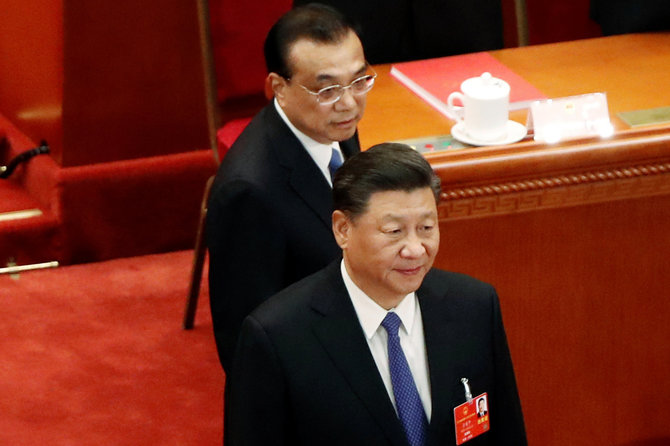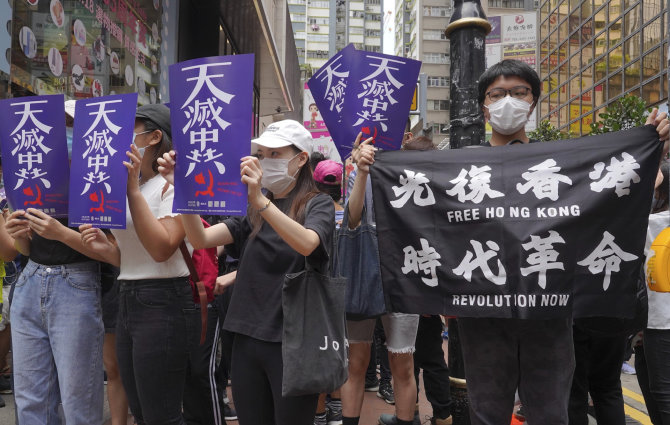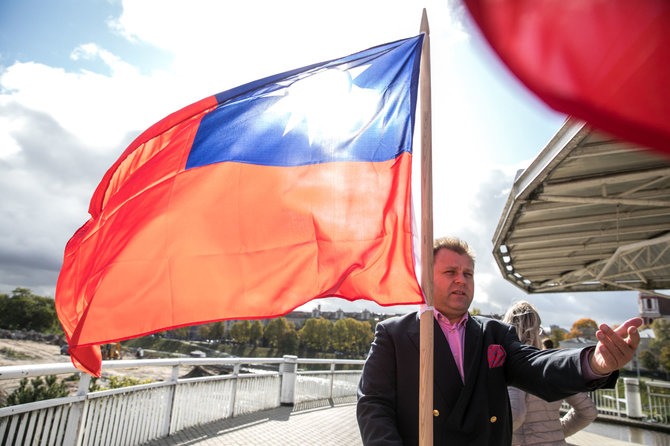Also, the hijacking of international institutions, forcing them to ignore their mission and work for the Chinese regime, as seen in the case of the World Health Organization, industrial espionage, technology theft and aggressive penetration of strategic Western sectors and markets under the guise of private companies, disinformation campaigns against the free world, cyber-attacks, the suppression of free speech and academic freedom also outside China, using influence organisations as well as political and economic leverage.
This is a very abbreviated list of actions that China has undertaken, since President Xi Jinping‘s advent, to deepen the Communist regime‘s grip on its society and to try the limits of tolerance in the rest of the world, taking increasingly arrogant and aggressive steps each time whenever a strong international response was not forthcoming.
However, when the so-called "parliament", the National People's Congress passed the national security legislation applicable to Hong Kong on May 28, China crossed a very important line.
The people of Hong Kong are striving for three things: to uphold the rule of law, the acquire the right to elect their own representatives and to preserve the autonomy guaranteed to them by the 1984 Sino-British Joint Declaration, an international treaty establishing Hong Kong's legal status. Those aspirations were demonstrated by the Hong Kong people in mass protests that began in June 2019, attracting up to 2 million people against extradition law imposed by China, which would have allowed Hong Kong people accused of crimes against China to be handed over to the Chinese maniland.
Mass protests formulated the so-called "5 requirements"; one of them demanded the right to elect its representatives to the highest representative Hong Kong body, the Legislative Council (or LegCo). The protests of the Hong Kong people, despite efforts to disperse them with water cannons, tear gas, brutal police violence, rubber and occasionally – real bullets, lasted for six months and culminated in municipal elections in November 2019. In these, the only direct democratic elections in Hong Kong, the pro-democracy candidates swept away the Beijing-backed representatives, sending a clear signal to the Chinese central government.
However, the rule of law, the right to democratically elect representatives, and autonomy from Beijing are ideas that terrify the Communist regime in China. Therefore, now that the world's attention has been arrested by the COVID-19 pandemic and protests in Hong Kong are being banned for quarantine reasons, the Chinese Communist government has decided to take a step that would eventually bring Hong Kong to its knees, undermining Hongkongers‘ ability to defend their rights and freedoms.
When, after a long hiatus induced by the coronavirus, the National People’s Congress convened for its annual session, it was announced that China would introduce national security legislation for Hong Kong; Hong Kong lawmakers themselves will not be involved in its development and approval. The law will „prevent, stop, and punish any conduct or activities that seriously endanger national security, such as separatism, subversion of state power, or organizing or carrying out terrorist activities, as well as activities by foreign and overseas forces that interfere in the affairs of Hong Kong “.
The decision to instruct the Standing Committee of Congress to draft and promulgate such a law was passed on May 28, with 2,878 deputies voting in favour, 1 against, and 6 abstentions. The law will enter into force at the end of June.
The law essentially means that Hong Kong people who pose a threat to the Communist Party can be charged with new crimes that have not yet existed in Hong Kong: subversive activities, separatism and terrorism. (The Chinese authorities use accusations such as these to justify the imprisonment of the Uighurs in the prison camps, as well as the genocide of the Tibetans.) The law will also allow Chinese secret police and state security structures to operate in Hong Kong. Thus, Hong Kong, which has so far been autonomous, fostered a free society and upheld the rule of law, sees the introduction of the same power through terror as is now operating in mainland China.
This move by Beijing violates the Sino-British Joint Declaration, an international treaty deposited at the United Nations, and the principle of "one country, two systems" enshrined in it. With the handover of Hong Kong to China in 1997, China solemnly undertook to ensure that Hong Kong maintains a "high degree of autonomy" encompassing freedom of expression and assembly, a multi-party system and the rule of law.
The new national security legislation violates not only this treaty but Hong Kong's constitution introduced by China, the Basic Law which stipulates that Hong Kong makes its own criminal laws and that its residents can only be punished under Hong Kong law and by Hong Kong's own legal institutions.
The provision announced by the Beijing authorities that allows mainland Chinese institutions, like state security structures, to operate in Hong Kong in order to "ensure" national security and "oversee" the implementation of the new security legislation also violates the Hong Kong Basic Law, which states that no central authority can interfere in Hong Kong affairs.
The Chinese Communist government used to violate this provision previously, when in 2015 Chinese secret agents kidnapped and took to the mainland the owner of a bookshop accused of distributing anti-China literature, thus sparking a wave of protests. Now a legal gate is being opened for an invasion of terror by the Chinese secret police.
The Chinese central government has no legal authority to supplement the Hong Kong Basic Law with national security legislation. Hong Kong lawyers also point out that the new legislation will also violate the International Covenant on Civil and Political Rights, to which the Basic Law commits itself.
This broader legal analysis was needed to make it clear that the new legislation proposed by the Chinese authorities is not merely yet another Communist provocation, but a very serious step to show that China has openly ceased honouring its commitments to the international community and started violating the international treaties it signed.
This aggressive move by China raises threatening implications, not only for Hong Kong but also for Taiwan, the South China Sea and other countries and territories that the People's Republic of China treats as its area of influence and target with territorial claims.
This breach of international norms is also in line with China’s escalation in international relations in recent months. During the opening of the National People's Congress, the fictitious "parliament" of China, the country's Prime Minister Li Keqiang, missed the usual adjective "peaceful" while ritually mentioning the sought-for unification of China and Taiwan. In the Communist newspeak, this is a lightly-concealed threat of military force to Taiwan. China has intensified military manoeuvres around Taiwan. An in the digital space, Chinese nationalists are increasingly demanding a military invasion of the island.
China is building artificial islands, which double as military fortresses, in the South China Sea, ignoring international law and violating the right to territorial waters and neutrality of international waters of its smaller neighbours - Vietnam, Indonesia, Malaysia, the Philippines, and Taiwan. (In 2016 the Hague Tribunal upheld the Philippines claim concerning the illegality of China‘s extension of its territorial waters.) More recently, hundreds, perhaps thousands, of Chinese soldiers have crossed China’s disputed border with India in the Himalayas.
In the face of this escalation and disregard for international law, Lithuania cannot close her eyes and stay away. We need to decide whether we want to defend those international norms that have allowed the world - and us - to be safe and prosperous in the course of the last few decades. The international norms in force after the Second World War - the non-use of force, the right of nations to self-determination, the supremacy of international law, compliance with international treaties and international arbitration institutions - allowed different ideological regimes to coexist more or less peacefully.
China, like Russia before it, is now challenging this model of peaceful coexistence based on universal international law. Russia has already demonstrated that without a firm response, it can render this international order an empty phrase. The West's concession to Moscow led to military aggression in Georgia, whereas overlooking Russia‘s attack on Georgia facilitated the war in eastern Ukraine and the annexation of Crimea.
China has been playing the same trick for a long time, albeit more slowly, more cautiously - and more dangerously. Western concessions to China over Tibet, over the Uighurs, the persecution of political dissidents and religious minorities has led to the current Communist regime‘s ambition to destroy Hong Kong’s rights and freedoms. Continued concessions on Hong Kong will lead to the capture of Taiwan - and further military aggression.
In Hong Kong, China is challenging the world, and Beijing hopes no one will dare to face down its challenge. But if the challenge is not met on time, the consequences are scary to contemplate. Our task, as members of the Western, free world, is first and foremost to ensure that the rule of law and the world order based on it are upheld.
If this does not happen, if we return to a world where international law is disregarded and free states give in to aggressors, it will be a world all-too-familiar to us - the world of Ribbentrop-Molotov pacts which lead to war, to crimes against humanity, to the occupations of free states whenever they fall into a „zone of influence“ of a tyranny, and to slavery for millions.
Democracies must, therefore, resist China's violations of international law. Only a firm stance of the free world can now prevent further aggression - and, in the long run, bring hope to the people of China, who are the primary victims of a bloody totalitarian regime.
Lithuania, as a responsible actor in the international community and a member of the European Union and NATO, must make a choice: will she stand with her oldest and most trusted allies, the USA and the United Kingdom, with democratic Taiwan and the freedom-loving Hong Kong people – or with the totalitarian and predatory Chinese Communist regime?
Although Lithuania is a small country, she is not powerless. What can Lithuania do?
First of all, Lithuania should withdraw from the "17 + 1" format, which seeks to divide the European Union and expands China's influence. Secondly, Lithuania must comprehensively strengthen her relations with Taiwan and support its political recognition in the international community as a de facto independent democratic state governed by the rule of law.
Third, to seek a united principled position vis-à-vis China in the political formats of the European Union and NATO. To propose sanctions against Communist Chinese government officials involved in human rights abuses in Hong Kong - and not only those in Hong Kong but also against the perpetrators of persecution of Uighurs and Tibetans, religious communities and dissidents.
Fourth, refuse to cooperate with Huawei in the development of 5G Internet connection, as well as with other Chinese companies involved in surveillance, espionage, and human rights abuses in China.
Fifthly, and perhaps most importantly, to offer immediate refuge to the people of Hong Kong fleeing the threat of violence by the totalitarian regime.
Lithuania has long been a haven for persecuted people, from Jewish communities in the Middle Ages to 16th-century Russian political refugees such as Prince Andrei Kurbski, to Old Believers, Calvinists, and other religious minorities, to 21st-century Russian and Belarusian dissidents. The people of Hong Kong, like previous refugees who were seeking freedom and real security provided only by the rule of law, would contribute to the creation and prosperity of the Lithuanian state - and to the strengthening of Lithuania's DNA as a bastion of freedom.


















